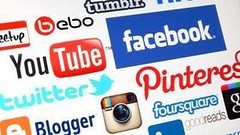Arthur Chrenkoff runs afoul of automated “community standards” enforcement on social media, getting locked out of his Twitter account for something that any actual human being would be able to instantly decide was not at all any kind of violation of normal human interactions online or in-person. Of course, if you’ve been in this position yourself, you won’t be surprised to find that launching an appeal of the bot’s action does not get immediate response … and sometimes never gets any attention from a human. He’s aware of this, and he’s still of the belief that this does not call out for any kind of government intervention:

“Automotive Social Media Marketing” by socialautomotive is licensed under CC BY 2.0
I remain broadly sympathetic to the free market argument that competition will, in time, cure any problems that business activity throws up from time to time, such as market domination or underhand practices. The mighty will be brought down low, new players will offer new products, consumer preferences will change, creative (or destructive) equilibrium will be restored. We can all argue, of course, to what extent free market and free competition exist in any particular setting at any particular time. If “real socialism” has never been tried, “real free market” (as opposed to capitalism, which is not necessarily the same thing) might be equally rare in practice. It is certainly true that comparing the lists of top 50 biggest companies one hundred, 50, 20 years ago and today will indicate a lot of economic change, but might not tell us very much about the reasons for that change, which can be quite complex.
The tech giants might not be historically unique as far as their size and power are concerned, but they’re not the norm either. They are not exactly monopolists, but their domination of their particular sections of the market elevates them from the domain of mere companies to something akin to public utilities. Google, Facebook and YouTube, for example, account for 80 per cent of digital advertising in Australia. There are alternatives to all these providers but they are so tiny by comparison as to defeat their main purpose for many users, which is to provide the biggest possible reach and exposure to the world. If you get demonetised or banned by YouTube, other video-sharing platforms can give you only a fraction of the traffic and the eyeballs, which impoverishes you literally and the internet users metaphorically, since they are now less likely to be exposed to the broad range of content. There are other social networks, but only Facebook has “everyone” on it, including your grandma, school friend from primary, and that couple you’ve met on the trip to Spain. Sure, if you get banned from Facebook, you can still try to keep in touch with all these people via many separate channels but it’s so much more difficult, disjointed and time consuming. For that same reason, Facebook’s Marketplace has a much better reach than other platforms that are focused exclusively on online ads. If Marketplace continues to shadow ban me, I can try Craigslist or Gumtree or Locanto, but – certainly in the categories I’m interested in – they all have significantly smaller audiences.
The traditional response to bad customer experience has been “try somebody/something else”. You don’t like Facebook – or Facebook doesn’t like you? Try another similar service. But I’m not sure if most of my friends would be able to name even one alternative to FB, and the chances they are on it are even slimmer. So telling people to stop whining and use an alternative to the tech giants is akin to telling someone “Oh, you can’t have a mobile (cell) phone? So what, no one is stopping you from writing a letter!” It’s the same but different. This is the consequence of the domination of the internet by the Googles and the Facebooks. And the internet now does play an essential role – for better or worse – in our lives and work. Hence the comparison to public utilities. Facebook might not be quite like electricity or running water, but it’s very close to, say, phone service. Yes, you can opt for another social network, but compared to Facebook this would be like a phone company that only makes it possible for you to contact one in twenty people instead of just about everyone, and even then maybe only once a week, at a time predetermined by the provider. It’s a service of sorts, but so inferior in every way to the main game in town as to be incomparable.
I’m not offering any solution to this problem. Many, both on the left and the right, are increasingly of a mind that, like Standard Oil of more than a century ago, the tech behemoths of today need to be broken down into smaller and less powerful units. That could solve some problems but won’t solve many others. Like mine, for example; a somehow “smaller” Twitter and Facebook can still be unresponsive and unaccountable. And as we know from other areas of economy, greater involvement and control by the supposedly impartial government does not guarantee better outcomes either. Big government, like big business, is run by human beings who, quite apart from their own characteristics as individuals, work within a particular culture, which has its own values, agendas and preferences. Government is a monopolist too in many ways, and for all the politics, is not necessarily responsive and accountable either.



